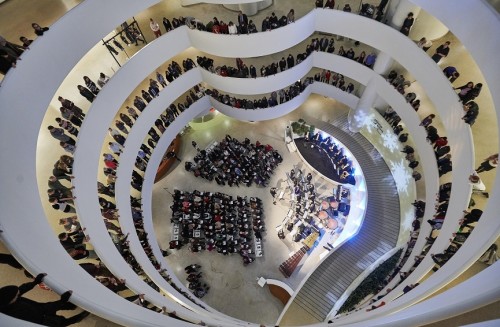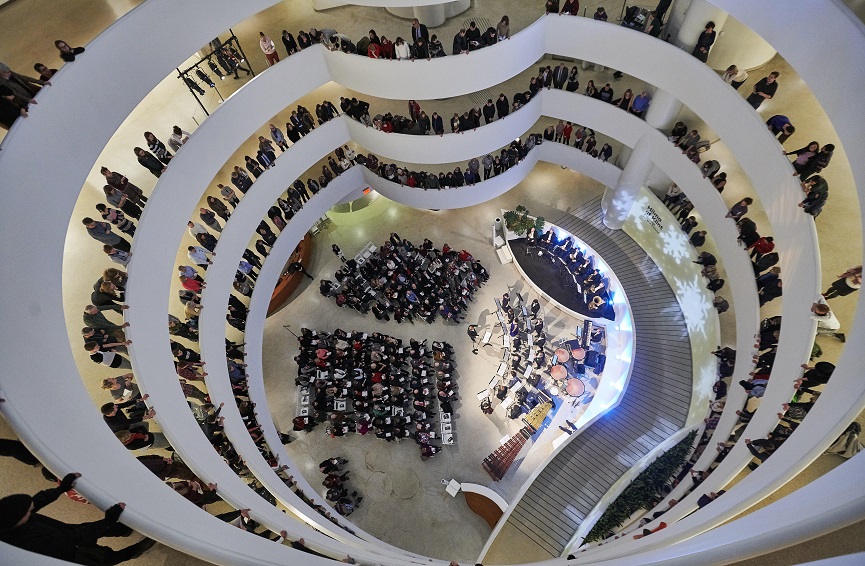 United States Holiday Concert: Vox Vocal Ensemble / George Steel (conductor), Solomon R. Guggenheim Museum Rotunda, New York, 16.12.2018. (RP)
United States Holiday Concert: Vox Vocal Ensemble / George Steel (conductor), Solomon R. Guggenheim Museum Rotunda, New York, 16.12.2018. (RP)

© Robert Altman
Steel – Rotunda Fanfare
Sebastián de Vivanco – Cantate Domino à 8
Britten – ‘A Hymn to the Virgin’
Glass – ‘Étoile Polaire (North Star)’
Gabrieli – Canzon primi toni
Sarah Kirkland Snider – ‘You Must Feel with Certainty’ (World Premiere)
Emmanuel Séjourné – Losa
Tormé – ‘The Christmas Song’ (arr. Murabayashi)
Traditional Carols – ‘Ding Dong Merrily on High’ (arr. Wood), ‘Once in David’s Royal City’ (arr. Willcocks), ‘The Holly and the Ivy (arr. Davies), ‘In Dulci Jubilo’ (arr. Pearsall), ‘God Rest Ye, Merry Gentlemen (arr. Willcocks), ‘Go Tell It on the Mountain’ (arr. Gibbs), ‘Joy to the World’ (arr. Steel), ‘Resonet in Laudibus’ (arr. Praetorius), ‘Coventry Carol’ (English anon. 16th century), ‘Hark, the Herald Angels Sing’ (arr. Willcocks)
It would seem that George Steel, founder and conductor of the Vox Vocal Ensemble, has divined the secret of Christmas cheer. On a cold and rainy night, people stood in a line that snaked down Fifth Avenue and around the block outside the Guggenheim Museum, waiting for the doors to open. Most were in relatively high spirits considering the weather, eagerly anticipating a New York City holiday musical tradition. Once inside, the atmosphere was downright merry: all the more amazing given most were standees, lining the rotunda’s spiral ramp that leads to a domed skylight.
Part of the concert’s allure is undoubtedly the venue, one of the city’s architectural wonders. The museum, one of Frank Lloyd Wright’s last buildings, ranks among his finest; it opened in 1959, just six months before he died at the age of 92. Steel understands the space’s acoustics and capitalizes on them, programming music that spans the centuries and, through refined musicianship, transcends clichés, although there was a fair share of popular favorites.
With the snap of the snare drum, the crash of cymbals and a blaze of brass, the audience immediately quieted. Lasting only a few minutes, Steel’s Rotunda Fanfare’ is the perfect curtain riser as well as attention grabber. ‘Ding Dong Merrily on High’ then filled the space, with verses sung antiphonally by two groups of singers positioned on different levels of the Rotunda. Britten’s ‘A Hymn to the Virgin’, composed when he was only 16, followed. Latin responses alternated with Medieval English verses, as the choir processed to the ground floor.
A secular spin on the traditional Lessons and Carols followed, an eclectic array of choral and instrumental works interspersed with the audience singing along to familiar carols. Steel’s arrangement of ‘Joy to the World’ with its high-flying trumpet descant was brash and brilliant, a bit more revved up than those by the late Sir David Willcocks. In this context, Philip Glass’ ‘Étoile Polaire’, with its combination of repetitive vowel sounds sung by three women whose voices provide an instrumental-like backdrop and a slightly trippy keyboard accompaniment, nestled easily beside an especially pure, meditative performance of the traditional ‘Coventry Carol’.
A new work was also premiered, Sarah Kirkland Snider’s ‘You Must Feel with Certainty’. It was commissioned by the Guggenheim Museum for this concert to celebrate ‘Hilma af Klint: Paintings for the Future’, a current retrospective of the pioneering and long under-recognized Swedish female abstract artist’s works. Af Klint also practiced automatic writing and drawing, creating works at the behest of spirits that she channeled in seances. Snider set one of these texts, ‘September 16, 1903’, for chorus and percussion (it’s not known whether the words were channeled or if af Klimt wrote them herself).
‘You Must Feel with Certainty’ exploited the Rotunda’s unique acoustical qualities with high-pitched drones, antiphonal effects, glissandos in the marimba, vibraphone and voices and quick staccato passages. With her ability to paint words (especially vivid when it came to depicting sprouting plants) in music and convey ideas in sound, Snider creates music that is not only beautiful but intriguing, capturing the spirit of the Swedish mystic whose paintings could be glimpsed in the adjoining galleries.
The brass ensemble played two Renaissance works, the Spanish composer Sebastián de Vivanco’s Cantate Domino à 8 and the Venetian master Giovanni Gabrieli’s Canzon primi toni. The surprise was Emmanuel Séjourné’s Losa, a duet for vibraphone and marimba inspired by Spanish Flamenco music, performed by Mike Truesdell and Sam Budish. (Séjourné is a French composer and professor of percussion at the Conservatoire de Strasbourg.) Facing each other, the two men engaged in a fascinating, intriguing, complex musical dialogue.
Allen Murabayashi’s arrangement of a holiday classic, ‘The Christmas Song’, is redolent of men’s glee club music, but of the sophisticated sort. Over the chorus’ tight harmonies and bouncy rhythms, bass-baritone Joe Damon Chappel’s voice was pure velvet. He ventured into the audience and sat down beside a young girl, charming her and everyone in the audience with his voice and personal warmth.
After one final Christmas carol blowout, ‘Hark the Herald Angels Sing’, it was back into the cold, but the rain had turned to snow. Just how had Steel arranged that?
Rick Perdian
